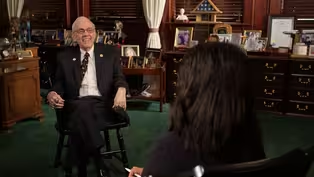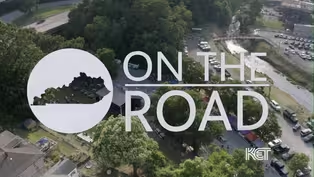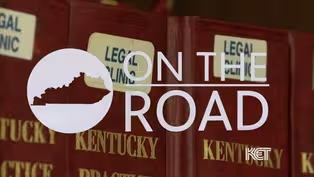
Gov. Paul Patton, Part 1
Clip: Season 2 Episode 19 | 7m 35sVideo has Closed Captions
Gov. Paul Patton talks about his affair and the state of the Democratic Party in Kentucky.
Former Kentucky Governor Paul Patton talks about his affair and the state of the Democratic Party in the Commonwealth. Originally Aired 6/27/23
Problems playing video? | Closed Captioning Feedback
Problems playing video? | Closed Captioning Feedback
Kentucky Edition is a local public television program presented by KET

Gov. Paul Patton, Part 1
Clip: Season 2 Episode 19 | 7m 35sVideo has Closed Captions
Former Kentucky Governor Paul Patton talks about his affair and the state of the Democratic Party in the Commonwealth. Originally Aired 6/27/23
Problems playing video? | Closed Captioning Feedback
How to Watch Kentucky Edition
Kentucky Edition is available to stream on pbs.org and the free PBS App, available on iPhone, Apple TV, Android TV, Android smartphones, Amazon Fire TV, Amazon Fire Tablet, Roku, Samsung Smart TV, and Vizio.
Providing Support for PBS.org
Learn Moreabout PBS online sponsorshipAs part of our road tour today, we spoke with former Governor Paul Patton at the University of Pikeville, where he is Chancellor Patent, who is from Pikeville, served from 1995 to 2003 in the governor's office.
And his time in office was highlighted by reforming higher education and workers comp.
But the end of his term was marred by a personal failing.
Tonight, we hear from him about his affair with a nursing home owner, Tina Conner, and if that impacted his future political aspirations.
Governor Patton, it's a pleasure to be with you.
Chancellor, I don't know what to call you, sir.
I do want to because we hear some clanging coming from your hands.
Governor.
And we want to draw attention to that.
Real quickly before we move on to talk more about the book.
Talk to us about your your your ring game going on here.
Again, I was president for four years.
Our basketball team won the NRA national championship.
We had about three or four women's bowling team national championships.
I lost their hand on this finger here and lost.
It led to cheerleaders trophy of some sort.
This is basketball.
Let's match kickball.
That's football and that's bowling.
So and we've got just don't have enough.
And you just don't have enough fingers.
I really have three or four more rings that.
You want to be able to lift your hand over.
Time.
We did something significant.
We we ball our team members brains and I just bought one for sure.
Why not?
That's what you can do is dance.
Let's return back to your book because we know that of all the accomplishments you had in policymaking, there were also some missteps.
Yes.
Tina Conner, one of.
Yeah.
Are you honest and open?
And do you reveal anything that we do not know about that situation?
I don't think that there's anything.
I do not go into details of that.
I just it happened that I was wrong and it almost destroyed my marriage.
And took some time to repair there.
I think we've seen that now.
We were very close now.
You mentioned about how it's taken you time to repair with Miss Judy First Lady Judy from that incident.
When you think about that, and that's almost more than 20 years ago now, how do you think that impacted your future political ambitions?
I mean, many have thought and you've said perhaps even the US Senate, what is going to be next after governor?
It probably did impact that, although in my position, I believe that my call for a tax increase had a lot more to do with not running for the Senate.
I certainly planned to run for the Senate, which was up one year after my term was ended, which gave me the year or two, laid the groundwork to do that, I guess.
Jim money.
And I think I would have had a good chance at race.
But the year before we had a depression and we passed a budget which by the time the legislature adjourned, it was obsolete, wasn't going to happen.
And so I publicly advocated for a special session to raise taxes, and I didn't get much support for that.
I do want to visit some other elements that are maybe addressed in your book in addition to the Tina Conner incident.
You also had some campaign finance issues and patronage issues with the merit system.
These things came after the ten hour Conner incident that were near the end of your gubernatorial reign.
Did those also have an impact, do you think, on your immediate legacy now that we're 20 something years beyond, perhaps there's a different view?
I listen, I had great relationships with the press.
I didn't hide from them.
We gave them never say they treated me well until the tenure kind of thing came up.
And then they sort of tried to play catch up.
And that's what I really think a lot of that stuff amounted to.
I know they made a big issue out of the bypass that summer, said going through the farm of a group of supporters of ours.
And they they tried to make that look like that.
That was favoritism.
After I left office, the inspector general over the Transportation Committee did a review of that situation and found out he was perfect, legitimate.
And so I think that after the tenure kind of thing, the press tried to play little catch up.
Let's talk about the Kentucky Democratic Party and where it stands now.
You know, even during your last few years in office, there were some shifts occurring where they were eventually would lose power of the Kentucky State Senate.
And then that, of course, as you know, a few years later, the House would fall to Republican hands, super duper majorities, as they're called now.
But we also look on the local level and a lot of the local elected officials identify as Republican.
How do you view the strength or the weakness of the Kentucky Democratic Party?
And is it in a position to make a comeback and win?
And what will it take to get there?
Well, not just to my career.
Kentucky is a very conservative state.
We are what I was Jared Pearce said we were didn't take sides in the Civil War.
And after the war, we sat in with the losers.
And so we became a southern state, you know, almost every respect except party registration.
And with the the Civil Rights Act of the Johnson era, we had all these other states switched from different from the solid Democratic South.
All of them switched to Republican except Kentucky.
And we maintained a Democrat tradition.
But the people were conservative and it started to sneak up on us.
My first term as governor, we started losing Senate seats.
We thought they were aberrations.
They were.
That was the that was the tide.
And you had switches and defections?
Well, in the last four for the second term, we had two switches for various reasons that made this city a Republican majority.
And so it we are a Republican state and.
And you contend I've always been a Republican state in voter performance.
Very forward.
You should have won his election against you.
Yes.
He was too overconfident.
He didn't work as hard as I did.
I would just miracle to win that election.
How about you write another book about that these days?
Thank you, sir.
Tomorrow night, we'll talk to Patton about his position at the University of Pikeville and his major accomplishments as governor.
Video has Closed Captions
Clip: S2 Ep19 | 49m 14s | Renee Shaw sits down with Paul Patton, the 59th Governor of Kentucky who served 1995-2003. (49m 14s)
Video has Closed Captions
Clip: S2 Ep19 | 2m 59s | CANE Kitchen has been working to improve physical and mental health through food. (2m 59s)
Video has Closed Captions
Clip: S2 Ep19 | 4m 4s | UK Legal Clinic is expanding its reach to provide legal services to more rural populations (4m 4s)
Providing Support for PBS.org
Learn Moreabout PBS online sponsorship
- News and Public Affairs

Top journalists deliver compelling original analysis of the hour's headlines.

- News and Public Affairs

FRONTLINE is investigative journalism that questions, explains and changes our world.












Support for PBS provided by:
Kentucky Edition is a local public television program presented by KET


